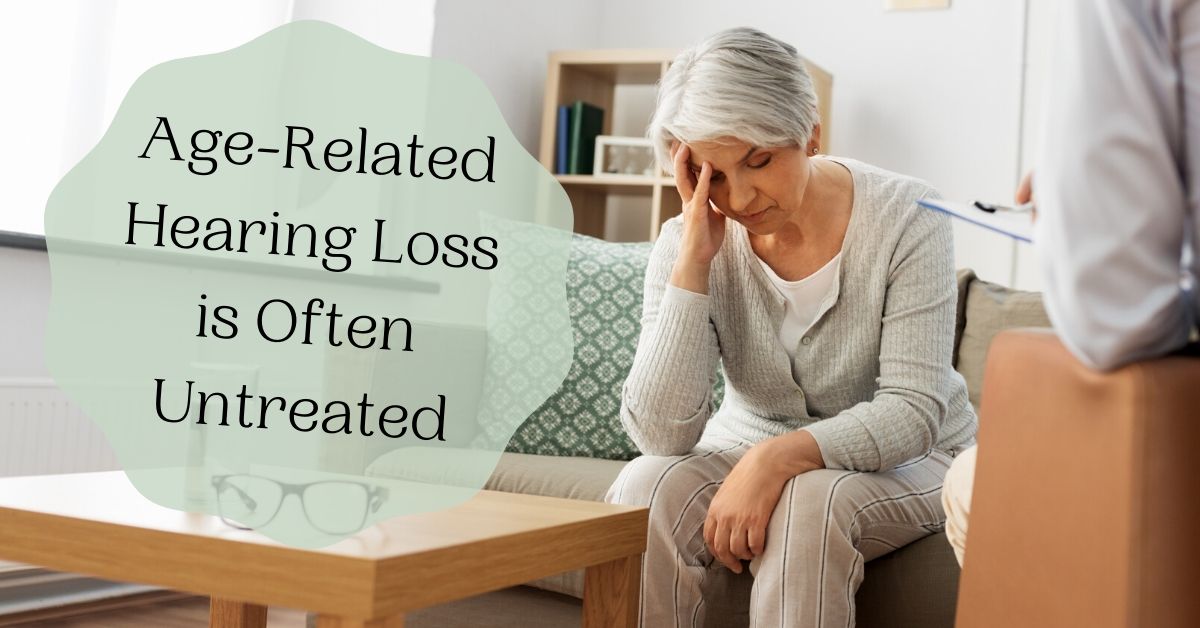
Age-Related Hearing Loss is Often Untreated
For over 40 years, it’s been the case that only one out of five people with age-related hearing loss wears hearing aids. Considering the deeply profound link between untreated hearing loss and overall physical and mental decline, this stubborn statistic is troubling. Fortunately, hearing aid technology gets better and better, and we now have the option of cochlear implants for those with extreme hearing loss that hearing aids can’t help. The surgery for cochlear implants has become very safe and routine, and is now an outpatient procedure.
How Do I Know When I’ve Got Problematic Hearing Loss?
It’s good advice to listen to those around you on this one. Usually, a person doesn’t know they’re suffering from hearing loss until someone else points it out to them. Unfortunately, it’s all too common for denial to be the first response when someone suggests we might have hearing loss. Unlike eyesight, where we know we’re having trouble seeing because the world is blurry or cloudy, hearing ability leaves few signs that it is failing us– we just don’t hear some things, or we might think people are mumbling when they talk. If we turn the television up, we can hear it just fine. It takes someone else in the room to point out that we have it turned up to a volume that is painful to normal-hearing ears. So remember: if someone is telling you that you have hearing loss, they’re probably right.
We tend to notice our own hearing loss only when it becomes terribly obvious. The first clear signs might come when we are out at a busy restaurant and we can’t distinguish our companion’s voice from background noise, or we are watching someone speak directly to us but we can’t distinguish between their consonant sounds. Keep in mind: when you notice these things, you’ve got a severity of hearing loss that should be treated as soon as possible to avoid a cascade of negative effects. Hopefully, you realize yourself that your lifestyle is in jeopardy if you don’t get hearing aids soon.
What Really Causes Hearing Loss?
While it’s clear in some cases and less so in others what the sure causes of hearing loss might be, we know that age-related hearing loss is by far the most common type of hearing loss, noticeable for many starting as early as age 45 and reaching disabling severity in over half of those age 75 or older. Age-related hearing loss happens as a result of the death of the cilia (tiny, hair-like cells) inside the cochlea in the inner ear. The cilia are responsible for transducing (converting) the mechanical energy of sound into electrical impulses to be sent to the brain. When they no longer function, sound energy doesn’t make it to the brain and so isn’t heard. Cochlear implants can bypass the cochlea and provide an electrical representation of sound directly to the auditory nerve, but at present the quality of sound provided is far too low to consider them a “cure” for hearing loss.
How Can I Avoid Age-Related Hearing Loss?
Genetic research is ongoing and increasingly demonstrating that even noise-induced hearing loss has a genetic component, but it seems that just about everyone will experience age-related hearing loss if they live long enough. Nearly 100% of people who reach 100 years old have hearing loss.
New research has demonstrated that those who closely follow the AMED (Alternate Mediterranean Diet), DASH (Dietary Approaches to Stop Hypertension) or AHEI-2010 (2010 Alternative Healthy Eating Index) will significantly slow the onset and decrease the severity of age-related hearing loss. It seems to be the case, as with so many other health-related concerns, that eating healthy foods has drastic effects on preventing hearing loss.
In the past, age-related hearing loss was seen as a fairly benign, if unfortunate, consequence of aging. More and more recent research suggests that untreated hearing loss leads to habits and changes in the brain that encourage the body’s decline through the aging process, and treatment is highly recommended to avoid consequences like loneliness (which has been shown to be as detrimental to good health as smoking 15 cigarettes per day), brain atrophy, earlier onset of dementia, and even physical injury due to decreased ability to balance. Let’s start turning the statistics around and get a hearing test sooner than later.
